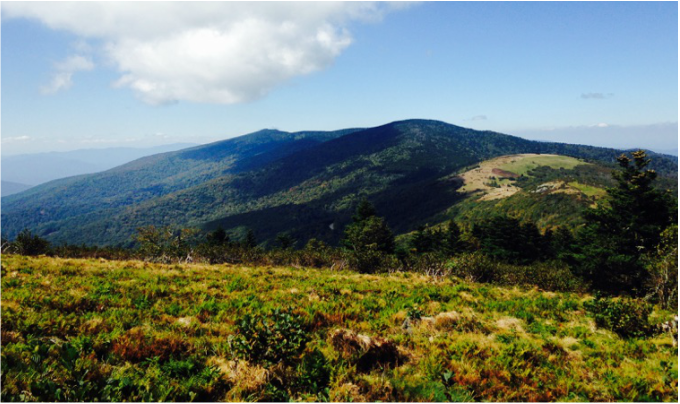 On invitation by the Wildlands Network, in September I participated in a discussion forum with four dozen conservationists that envisioned the establishment of a network of protected wild lands connecting Canada to the Florida Everglades and possibly westward along the Gulf Coast to Mexico. Now that is what I call a VISION! The group spent three full days in presentations, imagination, and discussion at the beautiful WildAcres Retreat Center in North Carolina’s Blue Ridge Mountains. While enjoying dramatic vistas of eastern North America’s highest mountain summit by day, and the glorious Milky Way galaxy above at night, three dozen invited conservationists and environmentalists joined with Wildlands Network founders, staff, board members, funders, and advisors to reflect on Wildland’s concept for creating an expansive, connected corridor of protected natural ecosystems and wildlife habitats extending across and around North America. Visionary thinkers and formulators of the Wildands Network and ReWilding America concepts – including Dave Foreman, Michael Soule, John Davis, and others – were present to offer their inspiration and perspectives. . . . (more) The vision for that massive wildlands corridor extends southward from Quebec and the Maritime Provinces of Canada, through the North Woods and Adirondack Mountains of New England and New York, on down the entire Appalachian Mountain range, then connecting by riparian corridors along the major rivers of the southern states, to recovering longleaf pine forests and South Atlantic wetlands and coastal natural areas, down Florida’s spine to the Everglades, and, possibly, sweeping on across the Florida Panhandle and over the Gulf Coast all the way west through Texas and Mexico, where it would complete the circuit by connecting with the Great Western Wildlife Corridor. Those connected wildlands and wildlife pathways would be suitable for reintroduction of viable populations of apex predators and would be recovered, fully functioning natural ecosystems.
Sometime it is good to pause for reflection and to be exposed to big, visionary ideas and seemingly impossible dreams, even for those of us who have long been “in the trenches” doing land conservation on incremental, feasible scales – and sometimes, yes, pushing the perceived limits of what can be done. I personally do not buy-in to arguments by the Wildlands Network and ReWilding visionaries that extensive repopulation by the top predators/carnivores (i.e., cougars and wolves) is the primary measurement of success in protecting and restoring America’s natural ecosystems. But the idea is interesting and thought-provoking for us working conservationists to consider. See what you think about the "re-wilding" idea. I recommend reading John Davis’s 2015 account of his 7,600-mile trek in 2011 along the conceived eastern America Wildway Corridor: Big, Wild, and Connected: Scouting an Eastern Wildway from the Everglades to Quebec (Island Press). Davis, a career conservationist and adventurer, is a former editor of the journal Wild Earth. In Davis's words: “Why trek 7,500 miles to advocate restoration of big, wild habitat connections? … (to) answer a basic question: Why wildways? Because we’ve taken too much already. Movement is as essential to animals’ lives as sun, water, food, and kin; yet we the people of North America have deprived our fellow denizens of their living and traveling spaces. Across the eastern United States and southeastern Canada, wildlife habitats are so diminished and fragmented by roads, dams, cities, agri-business, and other human developments that only by restoring and protecting of natural habitat—wildways—can we stanch the loss of biological diversity." --Chuck Roe, President, SCP Comments are closed.
|
When we see land as a community to which we belong, we may begin to use it with love and respect.... Conservation, viewed in its entirety, is the slow and laborious unfolding of a new relationship between people and land." There is in fact no distinction between the fate of the land and the fate of the people. When one is abused, the other suffers. From the PresidentSCP President Chuck Roe looked at land conservation along the route of John Muir's "Southern Trek." About ViewpointThis blog offers views of our Board and partners. We invite your viewpoint on the following questions: Archives
April 2024
Categories
All
|

 RSS Feed
RSS Feed